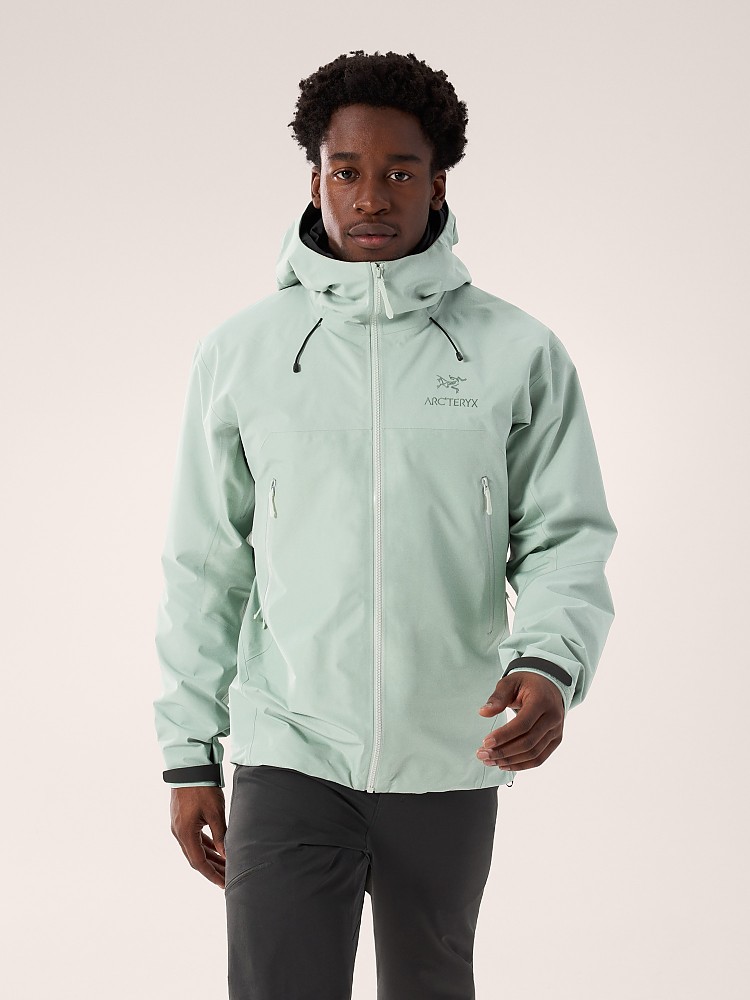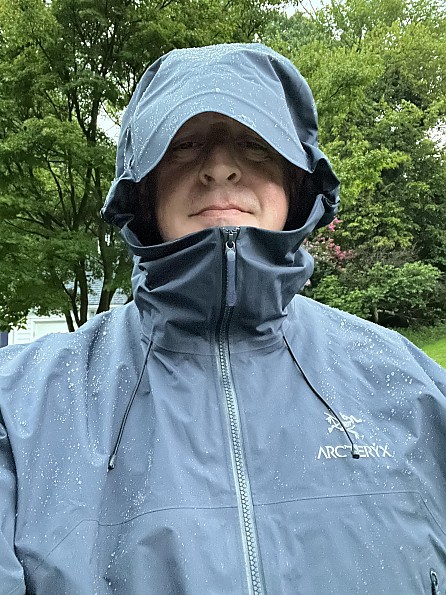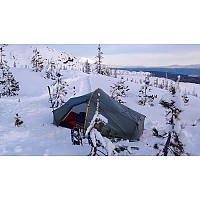Arc'teryx Beta AR Jacket Stormhood

The Beta AR is a medium to heavy Gore Tex hard shell that can deal with rain and wind all year for many years—great quality. It’s a full-cut jacket that runs true to size. It’s a pretty simple jacket, but it has features and adjustments that I think are pretty helpful when you’re outside a lot. It’s expensive, and the fabric can be noisy on windy days. I’m very happy with it.
Pros
- Arc’teryx quality
- High degree of weather resistance
- Useful adjustments
Cons
- Price
- Noisy

BASIC INFORMATION
My men’s size XL weighs 16 ounces. There are lighter-weight shell options—I have tested other Gore Tex shells that weighed less than 10 ounces. There are also heavier options—I reviewed the Arc’teryx Alpha SV, their heavyweight, and it’s 21 ounces for the same size. The difference lies primarily in the weight of the nylon shell. This jacket uses Gore Tex Pro shell, the highest cost and most durable option with Gore‘s waterproof/breathable membrane bonded to it. You can expect this jacket to last for years of regular/hard use.
A note on durability—I replaced a 10-year-old Arc’teryx Alpha jacket over the summer when the fabric started delaminating from the membrane. I made a warranty claim, which Arc’teryx honored. The company furnished a credit sufficient to fully pay for this jacket. So, an earlier iteration of this jacket lasted for nearly a decade, and when it had an issue that wasn’t wear and tear-related, they stood by their product. Bravo.
FEATURES
From the bottom up, there is a shock cord with dual toggles to keep weather out at the hem. They’re usable with gloves. The jacket has three pockets—two large zippered pockets at the chest and one small interior one. The small one is low profile, so the most you’re stashing in there is a smart phone or a few small items.

There are two pulls at the hem, one on each side.
The cuffs are adjustable with a tab that has a strip with hook/loop attachments (Velcro). The tabs are made of some kind of harder material—built to last. Zippers all have vinyl-feeling pulls and are all waterproof—big front zipper, two generously-sized armpit zips, and the front pockets.



The hood has three adjustments: two side pulls to tighten the opening (toggles are inside the fabric at the side of the hood opening, so they remain free from frost and ice), behind the head, and behind the neck. It’s one of the more adjustable hoods you’ll find, large enough to swallow a helmet, while retaining great visibility.


HOW IT FITS AND FEELS.
I’m 5 foot 9, and the hem falls about mid-thigh. Sleeves are just a tad long and well-articulated at the elbow, which helps with freedom of movement. The jacket has enough room to layer a heavy base layer and mid-layer, either a decent-weight fleece or a down sweater; a down jacket or parka meant for winter would be a tight squeeze.
The strongest wind I’ve experienced in this jacket, on a summit in the Adirondacks last summer, was about 40 mph, and the jacket provided a full barrier. I’ve worn it in drizzles and downpours and stayed dry, except for the sweat I generated going uphill. Gore Tex is a fine solution, but if you’re working hard, you need to open the armpits and probably partially unzip the front to really vent moisture from a high output climb.
All of Arc’teryx’s high end hard shells suffer from a common annoyance that is due to the durability of the fabric: it’s not particularly supple and rustles with a decent amount of noise in the wind. That’s a trade-off for the high level of durability that works for me; if noisy/crinkly fabrics give you hives, this might not be your jacket, and you can find Gore Tex shells with a softer fabric for less money, frankly. Also due to the relative stiffness of the fabric, this is a jacket I roll up it’s not the best for stuffing into small spaces.
HOW I HAVE WORN IT
The jacket arrived early last summer. I took it on every hike where I anticipated rain or a decent amount of wind—normally, for summers, I use a very light Patagonia Houdini. I brought this so I could get some good use out of it. I wore it on a number of local hikes in Maryland and Virginia and on a summer trip that included a number of day hIkes in the Adirondacks. In my book, that’s not enough use to say "highly durable," so my comments about that are based on past experience with similar jackets from the same brand. It is a pretty easy jacket to wear on hIkes in cruddy weather, and often wear it over a mid-layer instead of shifting to a more insulated jacket.
It’s nice that the chest pockets are safely above a backpack hip belt, and that the hood adjusts so well to wearing a ball cap in the summer as opposed to a heavier hat or helmet for skiing or climbing in the winter. The jacket vents moisture about the same as any other Gore Tex shell, meaning that if you are climbing something steep for an extended period, you’re going to sweat, and not all that sweat will be magically transported away. It’s still better than getting soaked in the rain or by a cold, hard wind, and you can expel a lot of moisture by opening up the armpits.

TAKEAWAYS
I didn’t find any meaningful faults in this jacket. It performs admirably. Whether you want or need to spend this much on a hard shell is a different question. I wouldn’t hesitate because I know this will last, so I won’t be spending a few hundred three to five years down the line to replace it…and I appreciate the protection this provides.
Background
Roughly six months of hiking, along with the usual dog-walking and other around town activity as my primary rain shell.
Source: Warranty replacement
Your Review
Where to Buy
You May Like
Specs
| Men's | |
|---|---|
| Price |
MSRP: $600.00 Current Retail: $600.00 Historic Range: $600.00 |
| Weight |
423 g / 14.9 oz |
| Sizes |
XS, S, M, L, XL, XXL |
| Fit |
Regular |
| Activity |
Hiking / Trekking / Ice Climbing / Alpine Climbing |
| Women's | |
|---|---|
| Price |
MSRP: $600.00 Current Retail: $600.00 Historic Range: $600.00 |
| Weight |
374 g / 13.2 oz |
| Sizes |
XXS, XS, S, M, L, XL, XXL |
| Fit |
Regular |
| Activity |
Hiking / Trekking / Ice Climbing / Alpine Climbing |


